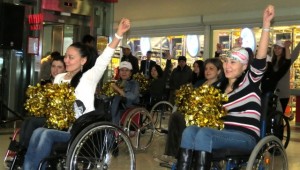 ALMATY – A group of physically challenged individuals put on a dancing flash mob show April 5 at the Maxima Shopping Mall.
ALMATY – A group of physically challenged individuals put on a dancing flash mob show April 5 at the Maxima Shopping Mall.
The flash mob was warmly welcomed by visitors. The three-minute performance was organised to show people that disabilities don’t stop people from enjoying their lives and even dancing.
“The event had a positive mood. Some visitors even joined in on our dancing. Frankly speaking, we didn’t expect so much attention,” said Sabina Kasimova, one of the participants.
“We love life and we like spending our free time with friends like all other teenagers. Unfortunately, we don’t have a lot of places like Maxima to meet, as there is still a lack of special facilities for people in wheelchairs in most of Almaty’s buildings,” explained another wheelchair dancer, Maria Tarasova.
Flash mob participants expressed their hope that such events will help clarify misunderstandings and encourage people to accept physically challenged people as equals and active social members of society.
The arrangement was organised as part of Empowerment Now! by the Civil Society Development Association ARGO and Shyrak, a public association of women with disabilities.
“Unfortunately, the number of disabled people in Kazakhstan is increasing. At the moment, there are more than 600,000 people with disabilities, among them are 200,000 women and 50,000 children,” said ARGO Director Executive Dzhamilya Asanova.
According to Asanova, the Empowerment Now! campaign is taking place in seven regions of the country supported by different on-site non-governmental organisations. This campaign includes seminars on the social adaptation of disabled people and workshops for parents. The campaign also seeks to bring youth with disabilities together with their peers.
“We also organise exclusive festivals and work closely with the media and offer seminars for journalists where we teach them appropriate terminology that can be used while covering topics about disabled people,” explained Asanova.
The Empowerment Now! campaign was launched in August 2012 and was supported by the United States Agency for International Development (USAID).
